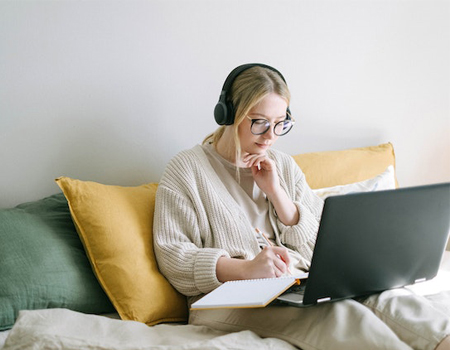This article was originally published on the website Porch on May 24, 2023 with the title Unplug: Expert Tips to Digitally Detox Yourself and Your Home and is republished with permission.
The internet has so much to offer, and with it at our fingertips, it keeps us hooked with its never-ending content and instant satisfaction. It’s like this irresistible force that keeps pulling us in, making us spend way more time online than we intended. In this captivating digital landscape, it’s really important to acknowledge the downside of spending too much time online. Internet addiction has been associated with many mental disorders, including low self-esteem, impulsiveness, poor sleep, mood disorders, and depression. This alarming fact underscores the pressing need for individuals to unplug, engage in digital detoxing practices, and find ways to restore a healthier balance in their lives.
In this article, we bring together the wisdom and insights of industry experts, psychologists, and technology enthusiasts who shed light on the importance of digital detoxing.
Their invaluable perspectives will provide practical strategies and inspiring stories to empower readers to take control of their digital habits and embark on a transformative journey toward a more mindful and fulfilling lifestyle. Stay tuned as we unlock the power of digital detoxing and reclaim your well-being in an increasingly connected world.
What healthy habits can families implement to promote digital wellness at home?
As parents, it’s very important to keep in mind that your kids will mimic you. If you use your phone during meals, if you’re distracted while they’re playing or trying to talk to you, they are more likely to reproduce that behavior. Eye contact and directed attention are very important in teaching good habits at home.
Additionally, I also recommend being very careful with the way children are familiarised with tech. Under 24 months, it’s better to avoid screens altogether. Once they grow a bit older, I recommend co-viewing videos with them to encourage interaction and to keep an eye on what kind of content they watch. It’s also best to avoid leaving screens in their bedrooms to better separate tech use from sleep and create healthy boundaries from the get-go.
When they grow into adolescence, it’s good to sit down together and create a family tech plan. This means that you will agree together, as a family, on rules and behavior to encourage. This plan applies to everyone in the household: rules aren’t only for children, and it’s the perfect opportunity for you as a parent to lead by example. The plan could include tech-free zones and moments (e.g., no phone use in the bathroom nor during dinner), guidelines to learn valuable content (e.g., each weekend, we tell each other something we learned online during the week), and tips to stay safe online.
Remember to make it clear that your children should always be able to come to you if something unusual happens online, whether cyberbullying, sexualization, the sight of graphic content, and so on.
Clo S. | Founder at This Too Shall Grow
Are there certain periods or activities during the day when it is particularly beneficial to unplug, and if so, why?
- Establish a rule of no devices allowed during meals. Place a non-negotiable “moratorium” on devices while eating together—and that applies to parents, too! In today’s nonstop world, many families are only able to gather all together when sharing meals. So, to avoid missing out on this precious opportunity to talk and connect, consider making meal areas “no device zones.” Stow devices away from kitchens and dining areas and be in the moment with each other.
- Young people should unplug from social apps during homework. They should focus on the task at hand, get it done right and well, and then they can reward themselves with some balanced recreational screentime. Although it was previously believed that multitasking demonstrated aptitude, new technology changed this idea, with current research overwhelmingly evidencing that multitasking with any external media during learning (in academic environments or at home) can negatively impact desired performance outcomes. All those extra opened screens and disruptions can also not only extend the time the work takes but cause loss of focus, patience, and ultimately a poorer work result, as well.
- Banish all devices just before bedtime. Good and restorative sleep hygiene is crucial to good health and well-being, especially for children and young adults. To avoid disruptive, delayed, or restless sleep, experts recommended unplugging, turning off, and stowing all devices at least one hour before bedtime. Keep devices outside of bedrooms at night and place them in charging areas away from sleeping areas.
- Be present and unplug during family time and when guests are over. When someone is splitting their attention between the shared experience and their devices, the potential message received by others (even if unintended) can be a lack of interest or respect.
What are the benefits of unplugging regularly, and how can it positively impact well-being?
Daily device unplugging is a key ingredient of long-lasting health and well-being. By committing to a morning and evening self-care routine of meditation and journaling, we ensure we stay in control of our thoughts and feelings and accomplish our priorities. By turning off our devices for brief times during the day, we’re able to check in with ourselves and become aware of what diseases (mental, emotional, spiritual, and physical) need our attention. And taking a weekly cyber-free Saturday or Sunday guides us in reconnecting with our inner world-our universe of infinite opportunities. The biggest benefit of device unplugging: spending our time healing ourselves and fewer trips to the doctor.
Mari L. McCarthy | Founder and Personal Growth Mentor at CreateWriteNow
How can digital nomads establish a healthy balance between their online and offline activities?
Digital Nomads use the internet as the means by which we complete work assignments, manage projects, remain connected to colleagues, family, and friends, pay bills, make travel arrangements, and coordinate living abodes when traveling abroad. We don’t realize it, but the internet is the lifeline for maintaining our financial solvency and psychological sustenance.
Pew Research reveals that 25% of Americans report being online “almost constantly.” For digital nomads, the time spent online can be exponentially higher. It is estimated that remote workers spend approximately 13 hours staring at their computer screens each day. This is 20% more than our in-office colleagues.
Because our online activities serve as an infrastructure supporting us as we live our lives, it’s hard to prevent the encroachment that can ultimately devour our offline lives if not kept in check.
Why must we manage the time spent online?
- The risk of being triggered at the physiological level by online news sources is greatly increased as research has shown information labels as news is typically biased towards negative content.
- Increased reliance upon the internet for social interaction and fulfillment has an adverse impact on happiness (research reveals that users who are happy with the time spent on social media platforms are those who spent less time using them compared to those who use social media more often).
- Social media algorithms encourage users to view, engage, post, and propagate negative interactions, according to research.
- Dependence upon anonymized online interactions makes it far easier to make negative comments, complain, and communicate in a highly critical manner.
- Overreliance upon online interactions to socialize offers fewer opportunities for sending, receiving, and deciphering nonverbal cues.
- Far-reaching dissemination of our online exchanges extends beyond our small circle of intimate family and friends.
- Indefinite storage of online social interactions written in haste may have highly detrimental consequences throughout and beyond an individual’s lifetime.
- Increased usage of social media can increase the probability of experiencing severe depression by 7% and Anxiety Disorder by 20%, according to research cited by SearchRemotely.
- Employers, using our online posts, can make overly general or false assumptions about our employability, personality traits, and buying habits, says studies cited by the Guardian, that could detrimentally impact their hiring decisions.
Each of these eight reasons alone should be convincing in and of themselves. Taken together, though, they might serve as a catalyst to change our habits. Why?
Because too much time (work time and leisure time) spent interacting online leaves less time available for offline social interactions. This is particularly vital to digital nomads because you have the world at your feet. Why spend so many hours on the internet when you have a new country to explore? New people to meet in person and novel ways for which you can gain first hand experience living among others of differing social norms and cultures?
A few ways to force yourself to balance the time spent socially engaging online is to offset the time allotted with exciting offline activities.
Here are some possibilities:
- Volunteer to join non-governmental associations to help in the efforts to eradicate poverty and homelessness.
- Learn more about the culture in which you are temporarily embedded by visiting museums, national parks, and trails.
- Resolve to become fully immersed in the culture by learning the language, visiting museums, taking a history course, or participating in local festivals.
- Volunteer to teach English with in-person classes and workshops.
- Send handwritten letters, postcards, and mementos to family and friends.
- Develop an interest in a craft (sewing, cooking, crocheting, knitting, model airplanes, trains) or art project.
- Cultivate an interest in completing intricate 3D puzzles, robotics, Paint-by-Numbers, and Origami.
- Maintain a handwritten journal, calligraphy, daily log, or start a scrapbooking project.
- Marvel in the difference in the ecosystem, architecture, land use, urban planning, or farming of the culture in which you reside.
- Learn culturally relevant board and card games with new friends and colleagues.
Tonya Mead, Ph.D. | CEO, & Chief Remote Manager of Search Remotely
What are some alternative activities or hobbies families can engage in when they choose to unplug from technology?
It is innately human to crave a sense of connection. However, over the past few decades, the connection has moved away from real-life interactions to likes and comments on the digital screen. We no longer marvel at the beauty of the world around us as our attention is fixated on technology. Not to mention our enjoyment of the mundane feels like a distant memory. Books gather dust on shelves, and conversations at the dinner table have been replaced with scrolling. We’re all guilty of scrolling on our small screens while the big screen lights up the room behind it. It’s time to reclaim the power in the now.
When families choose to unplug from technology, a world of alternative activities and hobbies awaits them. They can embark on outdoor adventures, exploring nature’s wonders through hiking, biking, or camping. Board games and card games become sources of laughter and friendly competition, fostering bonds and creating lasting memories. Engaging in arts and crafts projects sparks creativity and allows for self-expression. Cooking together transforms into a delightful experience as families prepare meals and share stories. Gardening teaches patience and responsibility, while volunteering as a family fosters empathy and strengthens communities. Unplugging from technology opens doors to quality time, shared laughter, and meaningful connections.
What are some spa-related tips people can implement at home during a digital detox?
The great thing about wellness is that people can really tailor their self-care to fit their individual wants and needs. There are plenty of ways to digitally detox with some spa-adjacent practices.
If you want to relax, take a warm bath with therapeutic salts or herbs, and add an aromatherapy element with a scented candle, diffuser, or luxe body oil. Make a healthy snack and enjoy it while you do some journaling. Try a gentle self-massage with a foam roller, massage device, or even a tennis ball.
If you prefer to be more active, apply a muscle rub or CBD serum to your neck, wrists, and back (to address all that time spent on your phone and at your computer), stretch, and then go for a walk or hike. I tend to hunch over while typing, so I like to undo some of that with heart-opening yoga poses and stretches.
Maybe a beauty regimen is in order! Personally, I love taking some time to do a complicated (but incredibly enjoyable) at-home facial or a nourishing manicure complete with nail art. Aromatherapy and relaxing music work well here, too.
But probably the best thing to do during a digital detox is to get outside because connecting with nature and getting some natural sunlight is key. Luckily, there are plenty of options for outdoor self-care for everyone. Go on a run, hike, or walk. Sit and meditate. Practice yoga or Pilates, which is also great for the wrists and tech neck.
Laura Waldon at WellSpa 360
Ultimately, embarking on a digital detox holds immense promise for transforming our lives in a world dominated by technology. It empowers us to regain control over our digital habits, fostering improved mental well-being, heightened creativity, and stronger relationships. We can rediscover a sense of balance by disconnecting from our screens and engaging in mindful activities, such as spending time in nature, meditating, or connecting with loved ones. While technology will continue to be an integral part of our lives, the key lies in cultivating a healthy and purposeful relationship with it. By consciously choosing when and how we engage with technology, we can find harmony, allowing us to fully immerse in the present moment and enjoy life to its fullest.
Author bio: Denisse Garcia is a content writer at Porch.com. She is passionate about the environment, technology, health and wellness, and home décor. When she's not writing for Porch, you can find her at the beach with her dog or cooking for her friends and family.
The featured image was acquired from Pexels.com website
Journaling Power Revolution Series





Leave Comment